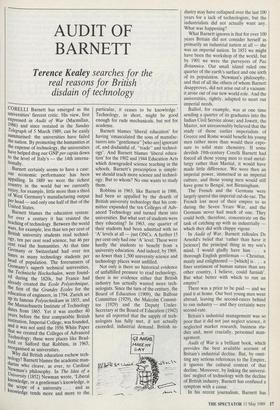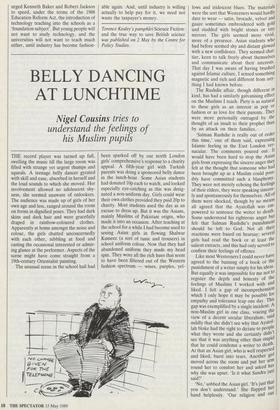AUDIT OF BARNETT
real reasons for British disdain of technology
CORELLI Barnett has emerged as the universities' fiercest critic. His view, first expressed in Audit of War (Macmillan, 1986) and since restated in the Sunday Telegraph of 5 March 1989, can be easily summarised: the universities have failed the nation. By promoting the humanities at the expense of technology, the universities have helped drag our GNP per capita down to the level of Italy's — the 14th interna- tionally. Barnett certainly seems to have a case: our economic performance has been appalling. In 1889 we were the richest country in the world but we currently enjoy, for example, little more than a third of West Germany's manufacturing output per head — and only one half of that of the United States.
Barnett blames the education system: for over a century it has resisted the teaching of technology. Between the world wars, for example, less than ten per cent of British university students read technol- °gY, ten per cent read science, but 46 per cent read the humanities. At that time Germany or Switzerland had over ten times as many technology students per head of population. The forerunners of Germany's superb technical universities, the Technische Hochschulen, were found- ed during the 1820s, but France had already created the Ecole Polytechnique, the first of the Grandes Ecoles for the education of engineers, in 1794. Zurich set up its famous Polytechnikum in 1855, and the Massachusetts Institute of Technology dates from 1865. Yet it was another 40 years before the first comparable British institution, Imperial College, was founded, and it was not until the 1956 White Paper that we created the Colleges of Advanced Technology; these were places like Brad- ford or Salford that Robbins, in 1963, reorganised as universities. Why did British education eschew tech- 112logy? Barnett blames the academic man- darins who cleave, as ever, to Cardinal 1•1 ewman's philosophy. In The Idea of a .University (1852) Newman wrote, 'Liberal knowledge, or a gentleman's knowledge, is the scope of a university . . . and as knowledge tends more and more to the. particular, it ceases to be knowledge.' Technology, in short, might be good enough for rude mechanicals, but not for academe.
Barnett blames 'liberal education' for having 'emasculated the sons of manufac- turers into "gentlemen" [who are] ignorant of, and disdainful of, "trade" and technol- ogy'. And Barnett blames 'liberal educa- tion' for the 1902 and 1944 Education Acts which downgraded science teaching in the schools. Barnett's prescription is simple: we should teach more science and technol- ogy. But to whom? No one wants to study them.
Robbins in 1963, like Barnett in 1986, had been so appalled by the dearth of British university technology that his com- mittee expanded the ten Colleges of Adv- anced Technology and turned them into universities. But what sort of students were they educating? In 1963, one quarter of their students had been admitted with no 'A' levels at all — just ONCs. A further 15 per cent only had one 'A' level. These were hardly the students to benefit from a university education. And indeed, by 1969, no fewer than 1,500 university science and technology places went unfilled.
Not only is there no historical evidence of unfulfilled pressure to read technology, there is no evidence either that British industry has actually wanted more tech- nologists. Since the turn of the century, the Board of Education (1909), the Balfour Committee (1929), the Malcolm Commit- tee (1929) and the Deputy Under- Secretary at the Board of Education (1942) have all reported that the supply of tech- nologists has fully met, if not actually exceeded, industrial demand. British in- dustry may have collapsed over the last 100 years for a lack of technologists, but the industrialists did not actually want any. What was happening?
What Barnett ignores is that for over 100 years Britain did not consider herself as primarily an industrial nation at all — she was an imperial nation. In 1851 we might have been the workshop of the world, but by 1901 we were the purveyors of Pax Britannica. Our small island ruled one quarter of the earth's surface and one sixth of its population. Newman's philosophy, and that of all the others of whom Barnett disapproves, did not arise out of a vacuum: it arose out of our new world role. And the universities, rightly, adapted to meet our imperial needs.
Balliol, for example, was at one time sending a quarter of its graduates into the Indian Civil Service alone; and Jowett, the Master, not unreasonably believed that the study of those earlier imperialists of Greece and Rome would benefit his young men rather more than would their expo- sure to solid state chemistry. If some devilish 19th-century Corelli Barnett had forced all those young men to read metal- lurgy rather than Martial, it would have made little difference. We were then an imperial power, immersed in an imperial culture, and those young men would still have gone to Bengal, not Birmingham.
The French and the Germans were largely spared this imperial cul-de-sac. The French lost most of their empire to us during the Seven Years War, and the Germans never had much of one. They could both, therefore, concentrate on the task of catching up with us industrially which they did with chippy vigour.
In Audit of War, Barnett ridicules Dr Arnold's belief that 'rather than have it [science] the principal thing in my son's mind, I would gladly have him . . . a thorough English gentleman — Christian, manly and enlightened — [which] is . . . a finer sentiment of human nature than any other country, I believe, could furnish'. But what better with which to run an empire?
There was a price to be paid — and we paid it at home. Our best young men went abroad, leaving the second-raters behind to run industry — and they certainly were second-rate.
Britain's industrial management was so poor that it did not just neglect science, it neglected market research, business stu- dies and, most crucially, personnel man- agement.
Audit of War is a brilliant book, which provides the best available account of Britain's industrial decline. But, by omit- ting any serious references to the Empire, it ignores the cultural context of that decline. Moreover, by linking the universi- ties' neglect of technology with the decline of British industry, Barnett has confused a symptom with a cause.
In his recent journalism, Barnett has urged Kenneth Baker and Robert Jackson to speed, under the terms of the 1988 Education Reform Act, the introduction of technology teaching into the schools as a `foundation subject'. But young people will not want to study technology, and the universities will not want to teach much either, until industry has become fashion- able again. And, until industry is willing actually to help pay for it, we need not waste the taxpayer's money.
Terence Kealey's pamphlet Science Fiction: and the true way to save British science was published on 2 May by the Centre for Policy Studies.



























































 Previous page
Previous page